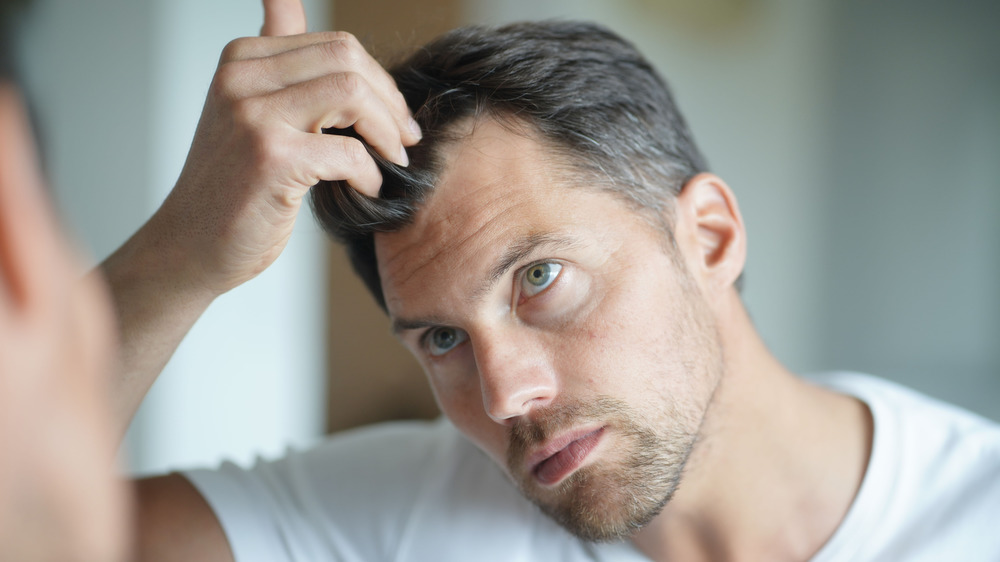This Might Be Why Your Hair Has Been Falling Out Lately
Between the holidays, the pandemic, and all of the issues that have arisen because of it, people are more stressed than ever. According to Hollywood's go-to Hair Loss Prevention Specialist and the CEO of Regenix, Bill Edwards, this added stress may be causing people's hair to fall out.
"Stress can be a major factor in hair loss. High levels of stress are often accompanied by poor nutrition," he told The List. "When stressed, the body has to utilize more nutrients than usual, which takes valuable nutrients away from the hair and scalp and further compounds hair loss."
So, if you've been in the shower and noticed clumps of hair coming out during your rinse, some of your lifestyle experiences may be part of the cause. This is particularly true since stress causes the body to tense up, restricting blood flow and inhibiting circulation to the scalp. "When hair follicles do not get the nutrition and blood flow necessary to function, they shut down and go dormant. Shortly afterwards, hair falls out," Edwards explained.
Making matters worse, when you haven't done a deep scalp cleanse, years of product buildup can contribute to your hair's fragility. With weakened follicles and a poorly circulated scalp, strands have a lower likelihood of staying healthy and in place.
Luckily, your hair has a natural replacement strategy
If you've noticed your hair thinning, it's definitely time to take a few preventative measures. But, understanding the way your mane works can help you treat the issue more effectively. In fact, every single follicle has a natural timing mechanism for when each strand falls out and when its replacement grows back. However, stress can impact this process as well.
"In normal conditions the two hairs can actually exist in the same follicle for a brief period. So, there is almost immediate hair replacement following hair fall," Edwards told The List. "When stress-induced hair fall occurs, there is a gap between hair fall and replacement, and usually, the replacement hair comes in weaker and thinner."
We know that stress can negatively affect countless biological processes, and it's important to note just how pervasive this issue can be — right down to which hairs stay in their follicles. Plus, the quality of the strands growing back in their place can be drastically diminished since they have less of the nutrients they need. Thin, sparse hair may be the result of unchecked stress.
Supplements and techniques can fortify your hair during times of stress
Stress is a part of life — there's no two ways about it. So, during those moments, it's vital to be supporting your mane with various lifestyle changes and supplements. Edwards recommends taking a B-complex vitamin on a daily basis and bumping the frequency up to twice a day during times of high stress. According to Healthline, B Vitamins carry nutrients and oxygen molecules to your scalp, helping your hair grow strong.
To further enhance circulation, your scalp can benefit from a massage as well. Edwards suggests "massaging to ease tension in the neck and shoulders and moving the scalp over the cranium to increase scalp flexibility. Though, make sure you massage without rubbing hair vigorously — which can cause even more hair fall."
If you're looking for a more in-depth shift, you can opt for a hair micro analysis to determine if product buildup is to blame for your thinning strands. From here, you may decide to look into a treatment to promote growth and thickness. Edwards explains Regenix's Stem Cell Therapy program, saying, "The stem cells act as building blocks to trigger new hair growth, and the Micro Needling, used to deliver the stem cells into hair follicles, causes thousands of micro traumas to the scalp. This triggers the body's natural healing energy to the scalp which further enhances hair growth."
From lifestyle choices to in-depth treatments, there are countless ways to make your hair grow back at the rate and thickness you desire.


